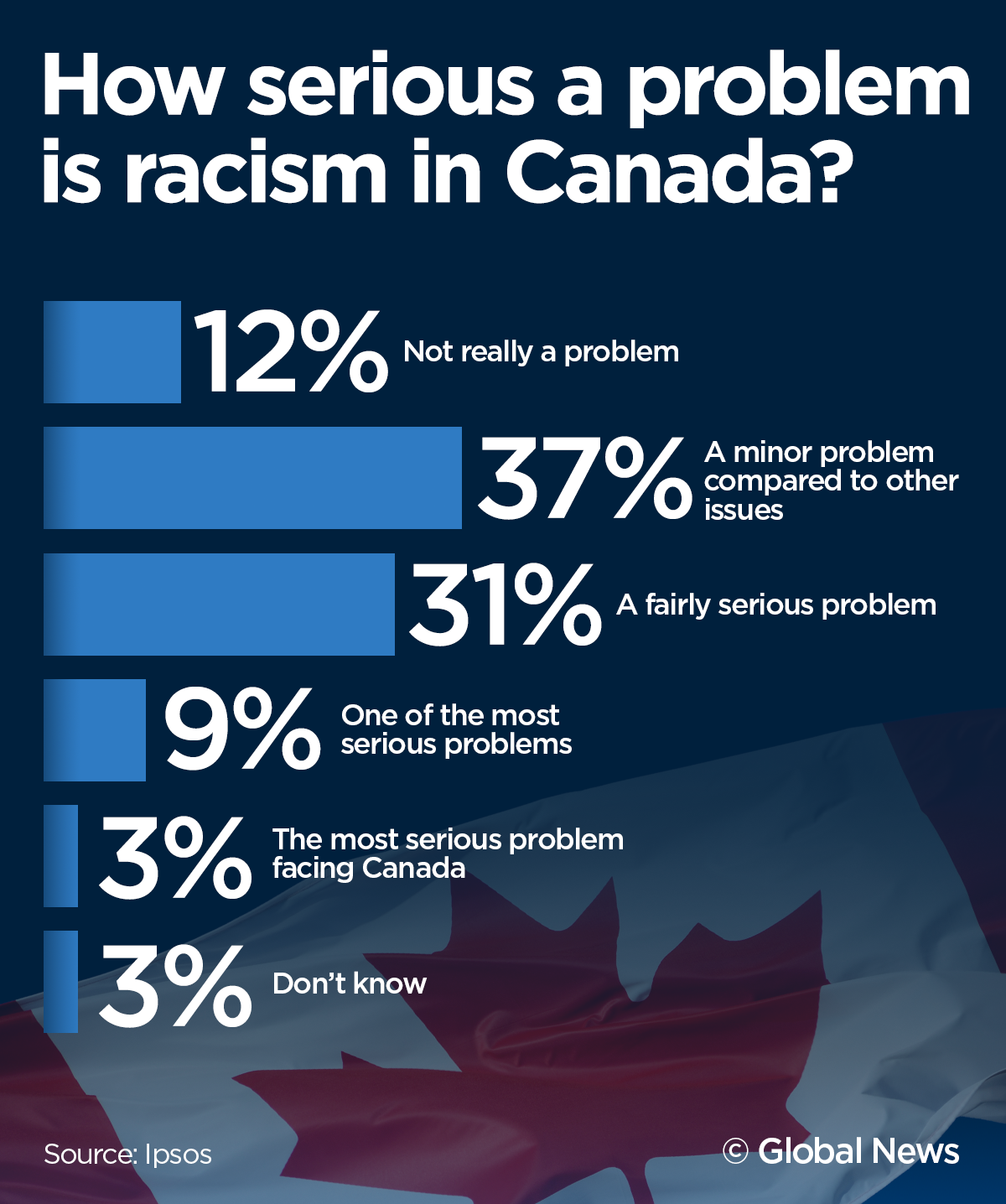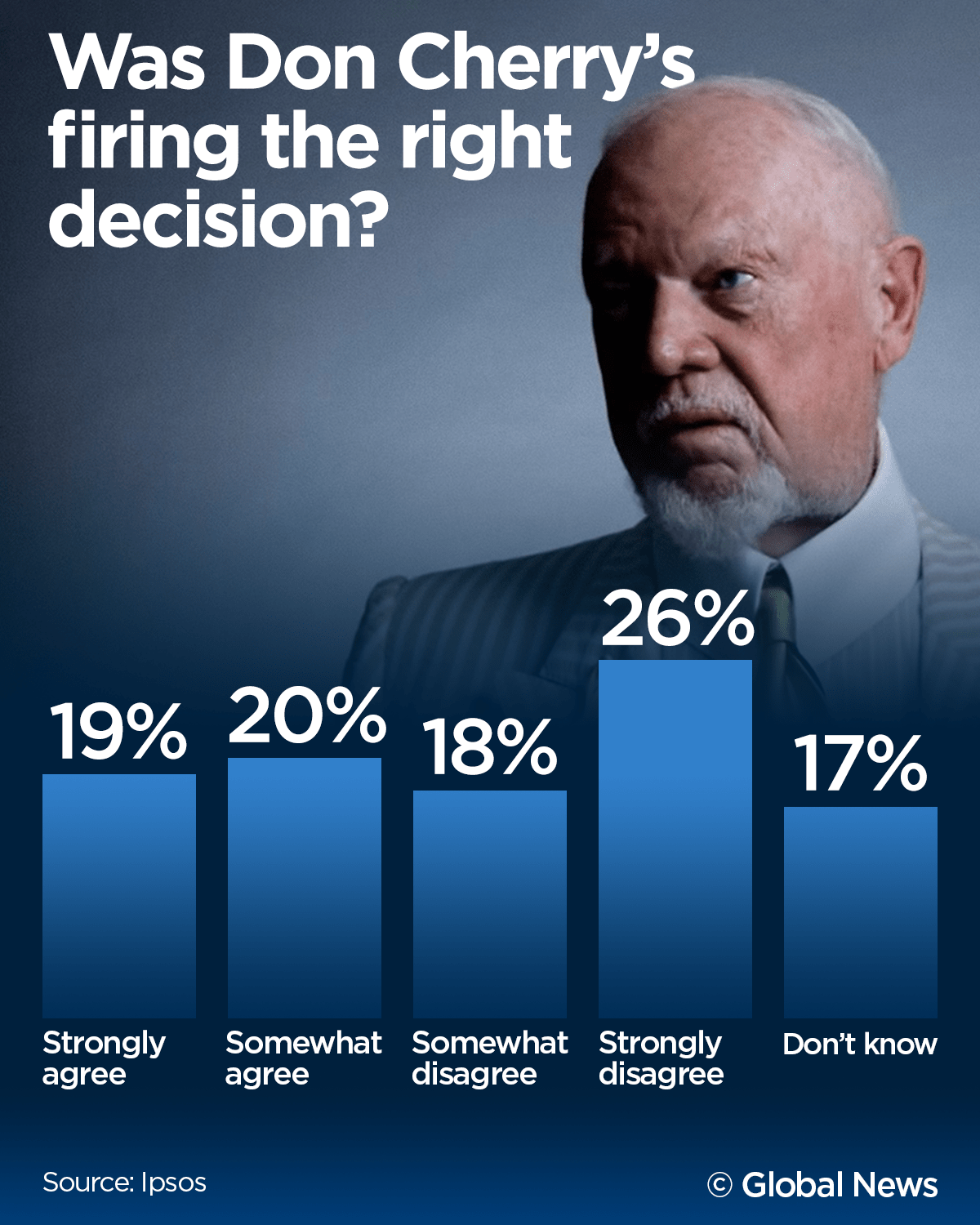Racism often captured headlines and took up space in public discourse in 2019 — but a new poll shows those discussions didn’t necessarily change Canadians’ opinions.

An Ipsos poll conducted on behalf of Global News found 49 per cent of Canadians don’t think racism is a serious problem in the country, while 43 per cent do.
Those numbers are similar to April findings, when 46 per cent said racism was a serious problem.
Sean Simpson, the vice-president of public affairs at Ipsos, told Global News that the poll was conducted to see whether key Canadian news events this year — including the federal election, videos and photos of Prime Minister Justin Trudeau wearing blackface and Sportsnet’s firing of Don Cherry — changed opinions.
“It’s both good news and bad news,” Simpson said.
“The good news is that things don’t seem to be getting worse. The bad news is that there hasn’t been a lot of improvement.”
- Life in the forest: How Stanley Park’s longest resident survived a changing landscape
- ‘Love at first sight’: Snow leopard at Toronto Zoo pregnant for 1st time
- Buzz kill? Gen Z less interested in coffee than older Canadians, survey shows
- Carbon rebate labelling in bank deposits fuelling confusion, minister says
Simpson also pointed to the poll’s finding that nearly four in 10 Canadians feel that “white Canadians are under threat from immigration” — a number that’s unchanged from April.
“I think people hold their opinions and things that they see and hear from leaders or celebrities reinforces their own positions,” Simpson said.
“Either they agree with what’s being said, or they disagree with what’s being said, but it doesn’t necessarily have impact or sway their own point of view.”
However, changing opinions on racism won’t happen overnight, noted Kathy Hogarth, an associate professor at the University of Waterloo, whose work focuses on marginalized populations in Canada.
“We can’t lose hope because our numbers aren’t changing as quickly as we want them to change,” she said.
“We need to continue having the conversation, and we cannot let the resistance to changing attitudes derail the attitudes about racism.”
Hogarth said Canadians have only begun to question issues such as racism in the justice and child welfare systems, and there’s much more to do.
“We’re only scratching the surface. We need to dig deeper to what are the pillars, what are the policies that are holding and breeding racism in place.”

Amira Elghawaby of the Canadian Anti-Hate Network added there needs to be systemic change in order for the country to truly understand and eradicate racism.
“We know that in our education system, there is not enough work being done to really understand Indigenous experiences in the this country,” she said.
“We’ve seen cutbacks in different provinces around funding and supporting Indigenous study, as well as looking at various forms of discrimination — Islamophobia, anti-Semitism and anti-Black racism.

“We need to have more in our curricula that reflects these experiences; they can’t sort of be tacked on as an afterthought.”
Elghawaby said that efforts to eliminate racism need to be supported by all level of government, citing the federal anti-racism strategy, which advocates will be closely monitoring.
“At the city level, as well, there’s much that can be done to ensure barriers to services, barriers to employment, and any type of hate that’s going on in our communities, we’re looking for solutions.”
An ongoing conversation
Conversations about racism need to go beyond just high-profile news events, both Elghawaby and Hogarth agreed.
“I think that in our media, we need to consistently and continually have these conversations,” Elghawaby said, noting Canadians did have meaningful conversations after the blackface and brownface incident and after Cherry’s firing — but then it faded.
“It sort of winds up being only when such a high-profile situation happens. It captures people’s attentions over a news cycle or two, then it fades from public consciousness.”

“We need to talk about these issues — and they are difficult conversations, but we still need to be having them,” Elghawaby said.
Hogarth added having ongoing conversations on racism would also help tackle the issue of polarization.
“When we begin to take an issue that’s really impacting the lives of a minority of people and make it a discussion point, people feel threatened, they feel the need to get defensive,” she said.
“We need to keep the conversation going because we need to understand that it’s not only a Black issue, it’s not a brown issue, it’s not an Indigenous issue. It’s all of our issue.”
Even beyond news events, she noted, conversations need to happen throughout the year — not just focused on specific months, such as Black History Month.
“The conversation must remain alive,” she said.
This Ipsos poll on behalf of Global News was an online survey of 1,002 Canadians conducted between Dec. 3-5, 2019. The results were weighted to better reflect the composition of the adult Canadian population, according to census data. The precision of Ipsos online polls is measured using a credibility interval. In this case, the poll is considered accurate to within plus or minus 3.5 percentage points, 19 times out of 20.






Comments